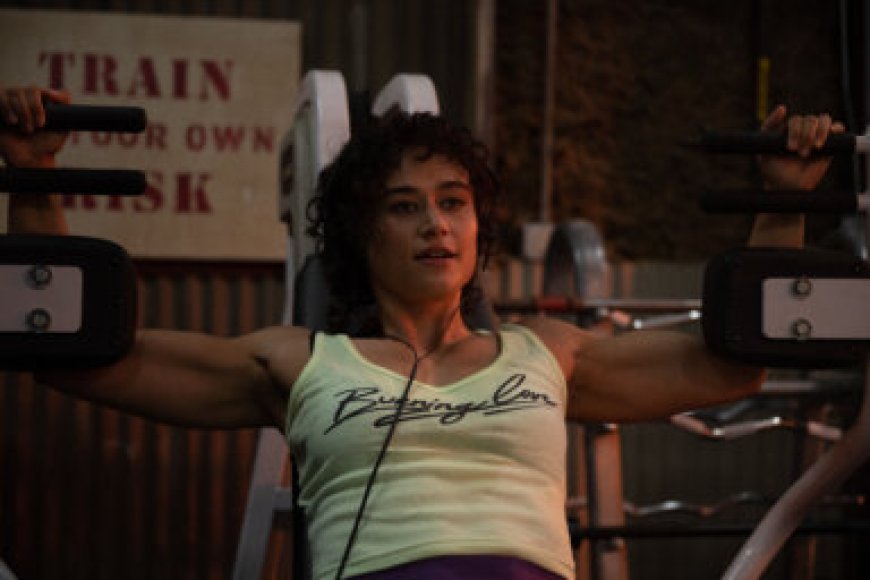Love Lies Bleeding’: Be gay, do crime, and then some
Set in 1989, Rose Glass’ “Love Lies Bleeding” flashes back to the ‘90s with wild abandon. Imagine “Wild at Heart,” “Thelma and Louise,” “True Romance,” “Bound,” “Natural Born Killers,” “Pulp Fiction” and “Fear and Loathing in Las Vegas” played over each other all at once. Yet it’s not just a movie about movies. Glass takes … Read More

Set in 1989, Rose Glass’ “Love Lies Bleeding” flashes back to the ‘90s with wild abandon. Imagine “Wild at Heart,” “Thelma and Louise,” “True Romance,” “Bound,” “Natural Born Killers,” “Pulp Fiction” and “Fear and Loathing in Las Vegas” played over each other all at once. Yet it’s not just a movie about movies. Glass takes violence more seriously than some of the films which inspired “Love Lies Bleeding.” The final shot of her debut film, “Saint Maud,” demonstrated her flair for images of cruelty. Her gorehound surrealism is tactile: handheld camera, close-ups (some quite extreme), garish lighting. If a movie could drip bodily fluids, this one would. Still, “Love Lies Bleeding” is honest about thinking through its title’s implications, for all its calculated outrage.
Bisexual bodybuilder Jackie (Katy O’Brien) meets Lou (out actor Kristen Stewart) when she drops by the New Mexico gym Lou manages, on her way to Las Vegas. They fall into a pattern of injecting steroids and having sex. (The film treats the drugs as an aphrodisiac.) Lou’s father (Ed Harris) owns the local gun range, which is a thinly concealed front for his work shipping weapons illegally to Mexico. Lou’s sister Beth (Jena Malone) struggles with her abusive husband (Dave Franco). Jackie’s entrance into this scenario proves volatile, upending life in this small town.
Jackie’s steroid use spirals into addiction. “Love Lies Bleeding” treats it with a vocabulary derived from movies about heroin and psychedelics. Glass delivers close-ups of syringes plunging into bulging veins, track marks and elbow-sized bastards. These shots dare the audience to look away. Jackie’s behavior looks like meth addiction, but once she arrives in Vegas, her chemistry-altered delusions take over. Her perception suggests a bad acid trip, with tourists sporting huge black eyeballs, female bodybuilders with misshaped bottles, slowed-down voices and the hallucination that she’s giving birth to Lou through her mouth when she’s really vomiting.
The America of “Love Lies Bleeding” is a mythic fantasy. Both Glass and co-writer Weronika Tofilska are European, and their film settles on a particularly lurid vision of the country, where gun culture and the Mexican border collide to bloody impact. (Given the location, it’s odd that the cast is almost entirely white.) It’s titillated by the existence of firing ranges and the concept of shooting guns as recreation, combining relish and disgust. Indeed, that’s true of many of the film’s images. (Lou’s introduced unclogging a diarrhea-filled toilet by hand.) Every wrinkle on Ed Harris’ face is visible, and his habit of letting a dung beetle run through his hand pays off in a particularly gross scene.
Glass selects images with a wicked sense of humor. She cuts from Lou masturbating to a shot of a cat eating. A car containing a man’s dead body is forced down a deep canyon resembling a vaginal slit. (This re-writes the y ending of “Thelma and Louise.”) Syringes and guns function as phalluses for women. But “Love Lies Bleeding” isn’t naïve enough to see this as entirely benign. When Jackie becomes unstable, her behavior is dangerous, even to other women. The film probably came close to earning an NC-17 rating, through scenes like the one where a man’s face is torn apart by being shoved into a table. The sight of the right side of Beth’s face swollen by her husband’s beating is indelible. If the gore is depicted with glee, “Love Lies Bleeding” also shows the pain that led to and follows it.
“Saint Maud” dived into religious belief through a different genre: horror. Its protagonist was a devout Catholic nurse taking care of a lesbian atheist dying of cancer. “Love Lies Bleeding” continues Glass’ interest in both queer women and the potential for fantasy to take over someone’s life. The final half hour leaves consensus reality behind, to a degree that the film enters Jackie and Lou’s own images of themselves. (As critic Brian Tallerico writes, it’s “all about obsession with things that make people feel powerful, particularly guns and muscles.”) If it becomes a bit too enamored with its own weirdness, “Love Lies Bleeding” puts a sapphic spin on neo-noir, flirting with clichés only to dodge away towards something more outrageous.
“Love Lies Bleeding” | Directed by Rose Glass| A24 | Opens March 8th at Regal Union Square and AMC Lincoln Center

 Mark
Mark 





